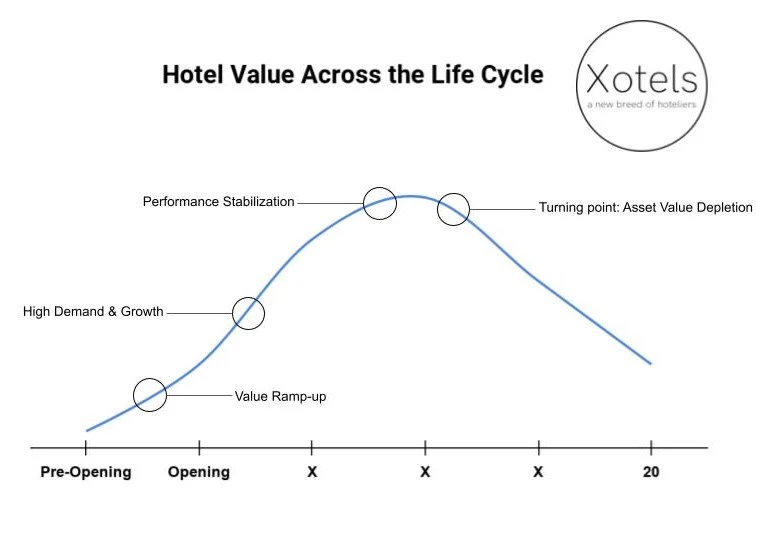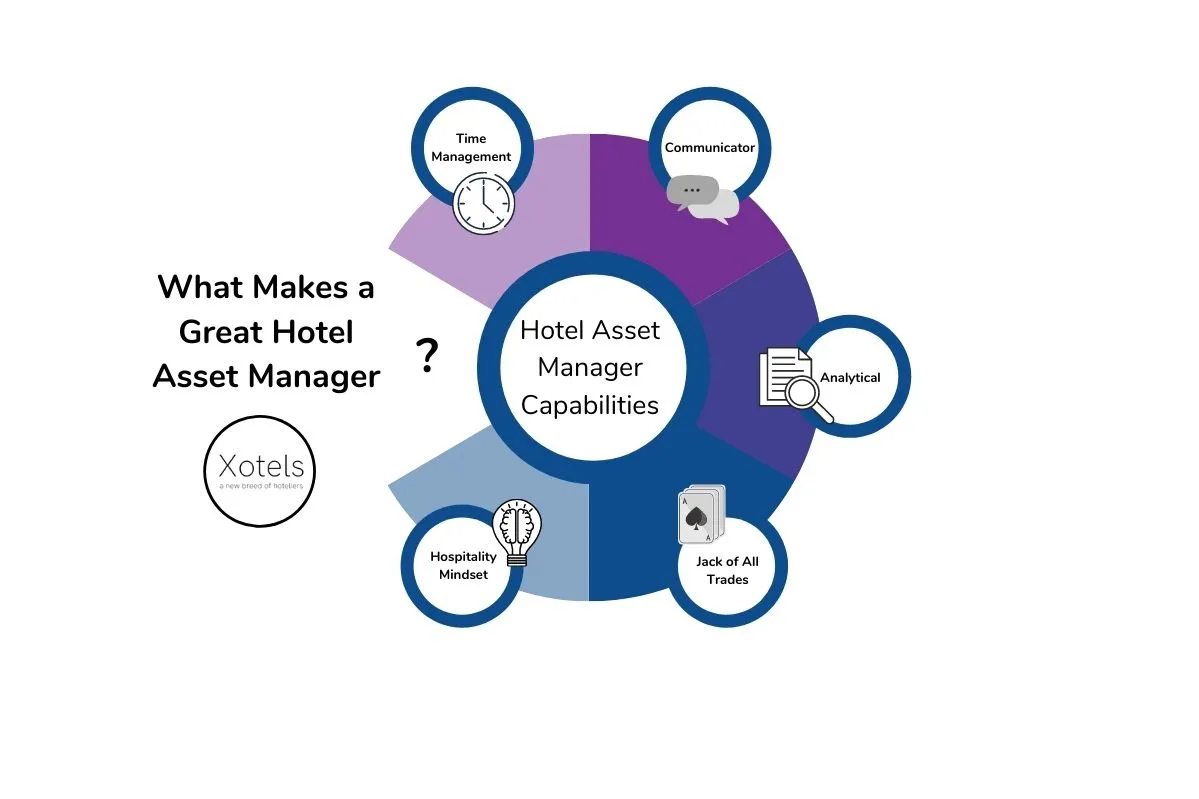Operating hotels for over more than a decade and a half with the Xotels team, we have noticed that many hotel owners and investors do not always see the need to engage with a hotel asset manager to oversee the strategic management of their lodging business. But if you’re not an industry insider, or are not up to speed with the rapidly evolving complexity and competitiveness of the hospitality industry, you might find yourself with a missed opportunity of optimizing profitability as well as mitigating risk exposure. Hotel Asset Management plays a key role in achieving a strong return on investment.
Hotels that can pivot fast and adapt to changes in the industry to protect cash flow and profitability are better positioned to seize opportunity and drive performance. Let’s discuss this in greater detail, so your hotel can take advantage of the benefits of effective hospitality asset management today.
In this article:
First, What Exactly is Hotel Asset Management?
Companies that provide hotel asset management services oversee funds on behalf of individual hotels or a portfolio of hotel properties. The overarching goal is to increase cash flow and value. They achieve this by optimizing operational processes for greater efficiency and driving the implementation and running of strategies and management practices.
The Role of an Asset Manager in Hospitality
Hospitality asset managers align investment and sell opportunities.
They carry out two principal roles:
- Increasing hotel value over time
- Preparing a hotel for sale at the peak of a lifecycle
Decisions are based on expected ROI and value-add that they bring, with a thorough review of the status quo and market conditions in mind. The difference in the role that a hotel asset manager carries out from the aforementioned two depends on where the hotel finds itself in its lifecycle (see the chart below).

Before opening a hotel
Hotel asset managers help with entering the market. Volatility in the hospitality market tends to be high, meaning risk is also high. The asset manager is responsible for mitigating this risk. Entering into a deal with a hotel operator without the help of an experienced asset manager can be very risky.
Once a hotel is open
If a hotel is already open, hospitality asset managers help with the following roles.
- Cash flow
- Flow-through
- Risk mitigation of further investments/business strategy
- Budgeting
- Forecasting
- Profit and loss
- Sales strategy
- Marketing
- Revenue Management
- Operational support (food and beverage, hotel management, purchasing optimization, and so forth)
In both scenarios, there should be a strong emphasis on bringing in quality investors as well as carefully planned, well-executed investments, with risk front of mind.
They have another vital role: that of mediator between owners and operators who have different objectives in mind.
An operator tends to be more focused on protecting their brand / image and on growing their footprint, whereas an owner may instead be interested in maximizing their profits or the value of the hotel.
Operators often yield greater power than owners. An asset manager, through experience and insight, provides an owner with a form of protection as well as greater power in the working relationship. Additionally, a specialized hospitality asset manager can make up for a lack of hotel expertise from either or both sides. It can be common for one or both parties to lack the requisite knowledge in hotel types, the local market, segmentation, pertinent brands, and hotel management best practices. In this type of situation, the asset manager has an important Information role to play. They provide key niche and high-expertise information where it is missing.
The goals for the hotel asset manager are to identify the right decisions to be made between owners and operators and to provide strong communication of information to keep everyone on the same page.
Capabilities and the Skill-set Required
The team roles range from data analysts and economists to asset managers and revenue managers, all bringing different types of expertise to the table.
These include the following qualities:
- Precise analysis
Assessing and discovering patterns and trends that support strategic business decisions
- Stellar communication
The need to get the right understanding across, including through interpretation of complex data. This is not an easy task and typically requires expertise.
- A first-class hospitality mindset
Without the right hospitality know-how and background it is difficult to make the right decisions. We often see a disconnect here at Xotels – where there is only an interest in the financial side without taking operations and guest experience into account on an equal footing, or the complete opposite.
- Outstanding time management
Processes require extensive planning to be successfully executed. Strong time management is a prerequisite to achieving excellence.

Challenges for Asset Managers in Hospitality
The hotel asset manager faces a number of crucial obstacles to overcome. They must understand the intricacies and complexities of the wider industry. No hotel is exactly the same, so an ability to be adaptable is necessary. For instance, there are so many aspects and variables in each hotel to consider. Moreover, an asset manager should understand competitor hotels inside and out too.
One possible issue from the outset is that there is usually a significant knowledge gap between the different involved parties and a high level of expertise can be difficult to communicate.

Three Benefits of Having a Hotel Asset Manager
Underneath the surface, many industry challenges actually represent opportunities for hotel investors to take advantage and have their lodging business move ahead of the competition and wider hospitality market. A hotel asset management company with strong pedigree can unleash these opportunities within.
The three main benefits that a hotel asset manager brings include the following:
1. Higher awareness and communication levels
All information is quickly forwarded to the owner and/or management. Asset managers can provide better quality data and reporting. At Xotels, our revenue team provides deep insights into what is coming with forecasting and budgets with comprehensive and easily digestible reporting.
Another value-generating improvement is the standardization of processes, which leads to improved consistency in quality and reduced operating costs. This occurs at all departmental levels, including human resources, operations, revenue management, marketing, and sales.
2. Industry connections
Hotels benefit from more quickly established and stronger relationships with distributors, competitors, website makers, and contacts in the local businesses board or municipality that we at Xotels and other partners are in touch with.
International connections help to bring in foreign investment if required and a strong hotel asset manager typically understands how to funnel external investment.
3. Qualitative growth
The right asset management firm focuses on growth of the portfolio in a qualitative manner. This means that they don’t have a buy/sell mentality. Importantly, this is different from banks and large venture capital firms. The impact of the latter is that it can lead to a decrease in service quality and products offered, because they are so focused on squeezing every last cent and cut costs wherever possible to make a profit.
Merging expertise from hotel management, revenue management, marketing and asset management greatly improves the growth opportunities without sacrificing on quality.
The Need for Hotel Asset Managers
There is a growing need for hotel owners to work with industry-specialized asset managers. There are a number of reasons that are fuelling this.
One, industry complexity is increasing all the time, and relationships can easily become tied up. When stakes are high, this is particularly risky. Two, hotels can struggle to find investment while simultaneously maintaining quality standards across their business.
Three, hotel investors face challenges when deciding which projects to channel their capital into.
Four, there is so much untapped potential within hotels because of a lack of resources and a deficit in process understanding. It is understandable that many hoteliers and other industry managers have not developed the required advanced knowledge and expertise in the field of asset management, whether it be due to their educational background or simply because there have not been enough opportunities to develop their skills outside on the job learning.
How to Set your Hotel Business Up for Long-term Success
To successfully implement an asset management strategy for a hotel, it is important to pay attention to each of the following elements which play an essential role in the execution and control of your strategy.
Communication and mediation
Delivering knowledge in a fast and efficient manner to all parties involved will increase awareness of performance, and will enable faster decision making. This also applies to the mediating role that asset managers play. The possibility of any delays due to disagreements is highly reduced by the mediating role of the asset manager, therefore directly having a positive impact on the cost involved.
Performance enhancement
Performance enhancement will be required across all units, including operations, marketing, revenue, sales, and accounting. In essence, this means that the hotel as a whole will have to be reviewed to maximize results. Not taking the opportunity to turn specific departments/processes around could adversely impact other initiatives that have been taken, negatively counterbalancing any previous progress that has been made. This is often seen at investment firms prioritizing quick return on investment, whereby isolated optimizations are implemented which come at the expense of other departments at a later stage after their part of the deal is completed.
Creativity and industry understanding
So many hotels have the plans to turn their performance around backed up by their hospitality knowledge, but suffer from a lack of process creativity, a misunderstanding of the hotel market, and sub-standard background knowledge.
From an asset management perspective, this typically is seen the other way around, where the financial and market knowledge might be there, but the essential hospitality knowledge is lacking to truly make the difference.
The clients’ interests always front of mind
Keeping a clients´ interests front and center is essential, whether it is to improve value over time or prepare the hotel business for a sale. Making decisions that are misaligned with the interest of a client could prove to be disastrous, and negatively impact the value of the hotel.
Strong return on investment
All in all, when push comes to shove, ROI is king. By focusing on the elements discussed in the article and by bringing in the right knowledge, it is possible to retain high quality of service without compromising ROI.
I hope that this article has helped you to gain more insight into the world of hotel asset management and how it can strongly benefit your hotel business.
Cheers,
Patrick Landman
PS. Need help with managing your hotel assets? Our Hotel Asset Managers at Xotels provide expert help to support your business in making the right financial decisions. Bring in the experts!




